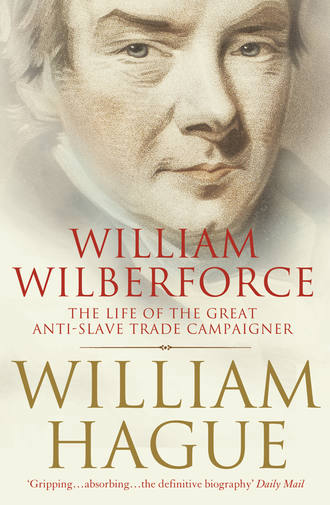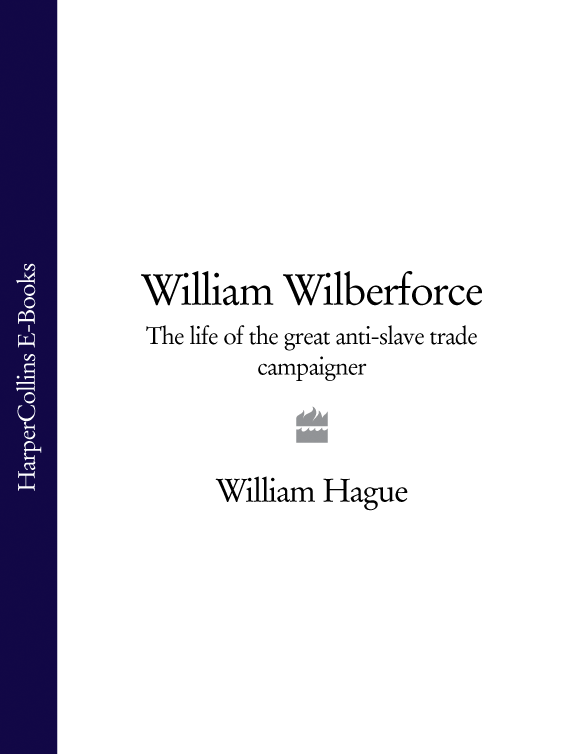
Полная версия
William Wilberforce: The Life of the Great Anti-Slave Trade Campaigner


WILLIAM
WILBERFORCE
The Life of
the Great Anti-Slave Trade
Campaigner

WILLIAM HAGUE

For Ffion
CONTENTS
Cover
Title Page
Dedication
Prologue
1 One Boy, Two Paths
2 Ambition and Election
3 The Devoted Acolyte
4 Agony and Purpose
5 Diligence and New Causes
6 The Trade in Flesh and Blood
7 Early Optimism
8 Eloquence Without Victory
9 ‘An Overflowing Mind’
10 The Independent
11 Consuming Passions
12 Darkness Before Dawn
13 Abolition
14 High Respect; Low Politics
15 The Struggle Renewed
16 Under Attack
17 Trials of Faith
18 ‘An Increase of Enjoyments’
19 His Feet on the Rock
Bibliography
Index
The Abolition of the Slave Trade
Notes
Acknowledgements
Praise
By the Same Author
Copyright
About the Publisher
PROLOGUE
An observer of the House of Commons that Monday afternoon, 23 February 1807, might have thought it a day like any other: the Members walking in and out in the middle of predictable speeches, others sitting facing each other on the tiered green benches, all giving off the hubbub of gossip which was a sure sign that they were waiting for something important and were not enthused by the proceedings before it.
There was, after all, no shortage of subjects for the Members to discuss as they watched and waited. The government of Lord Grenville was at such an impasse in its relations with King George III that its fall from power could be imminent, and the war with France, which over fourteen years had cost tens of thousands of lives and added £350 million to the national debt, seemed deadlocked. If national crisis and European conflict were not enough for them there was plenty of drama closer to home: that morning, at the hanging at Newgate of three convicted murderers, Messrs Holloway and Haggerty and Elizabeth Godfrey, the attendant crowd of twenty thousand had become so tightly packed that thirty spectators had died in the crush. No wonder the MPs that afternoon seemed to pay little attention to the tedious routine of their chamber: a complaint against the Sandwich Road Bill, a committee seeking to take evidence in Ireland, a short debate on the Poor Laws Bill, an alteration of the general election result in Chippenham, all typical of the daily fare of the House of Commons at the beginning of the nineteenth century. Only after all these matters had been considered did the Speaker call for the business that was keenly awaited on the floor of the House and in the public gallery, and ask the Secretary of State for Foreign Affairs, Lord Howick, to move the second reading of the Slave Trade Abolition Bill.
The slave trade had been debated in the same chamber and by many of the same people for nearly two decades. Year after year the evils of the trade, ‘founded in robbery, kidnapping and murder, and affording an incentive to the worst passions and crimes’,1 as Lord Howick was soon to refer to it, had been brought before the attention of MPs. Year after year the Bills proposed had been rebuffed, delayed, abandoned amidst the lengthy taking of interminable evidence or brusquely thrown out in the House of Lords. Once again that Monday afternoon the arguments were deployed. The abolition of the trade would lead to the better treatment of slaves already in the West Indies; the great ports of Liverpool and Bristol were not remotely dependent on it; and most of all, the House of Commons could no longer accept the principle ‘that British subjects are allowed to tear by violence from their home their fellow creatures, to take them from their family, and from their friends, to convert them from free men into slaves, and to subject them for the remainder of their lives to the arbitrary will and wanton caprice of others’.2 Once again, as afternoon wore on into evening and the candles were lit around the chamber for a sitting long into the night, the House had to endure the arguments to the contrary. There was General Gascoyne, the Member for Liverpool and ‘conservative to the backbone’, drawing attention to the capital invested in forty thousand tons of shipping and the employment of four thousand seamen. He warned of mass insurrection among the slaves if the Bill were carried. There was Mr Bathurst of Bristol calling for a tax on the importation of Negroes rather than total abolition, for ‘sufficient notification had not been given’.3 There was George Hibbert of London, who had twenty-five years’ experience of investments in Jamaica, arguing that Africa had ‘invited’ the slave trade rather than ‘the slave trade seduced Africa’.4 For those who had longed for Britain to take the lead in removing ‘one of the greatest sources of crimes and sufferings ever recorded in the annals of mankind’,5 the arguments deployed were a heartrending reminder of the defeats and disappointments of the past.
Yet on this night there was one crucial difference, and everyone present knew it. The Bill would be passed, not merely by a small margin but by a huge one; not then passed into oblivion but this time enacted within a few weeks as the law of His Majesty’s Kingdom and all of his Islands, Colonies, Dominions, and Territories. A nation which had transported over three million Africans across the Atlantic and invested vast sums in doing so would, from 1 May that year, outlaw such a trade and declare any vessel fitted out for it to be forfeit. The Royal Navy, the most powerful on earth, which had henceforth protected that trade, would from that day enforce its annihilation.
This Bill would finally succeed in abolishing the practices of decades and changing the behaviour of an Empire, and the MPs, still in their seats as midnight came on, now knew it. For unlike its predecessors, it came with the full force of a united ministry behind it and had already been passed by the House of Lords, for all the fulminations of the future King, the Duke of Clarence. Its passage would be hailed by the Prime Minister himself as the ‘most glorious measure that had ever been adopted by any legislative body in the world’,6 while the veteran campaigner Granville Sharp would drop to his knees in prayer and thanksgiving: the dam which had held back twenty years of anger, revulsion, education, petitioning, campaigning and parliamentary struggle had finally burst.
When four o’clock in the morning came the Members were still there in force, and in voting 283 for the Ayes and only sixteen for the Noes they would render the close or negative votes of earlier years hard to believe. Yet before they did so, speaker after speaker would single out one of their number as the architect of the victory to come; one who had found twenty years before that the trade was ‘so enormous, so dreadful, so irremediable’ that he had ‘from this time determined that I would never rest till I had effected its abolition’;7 one whose speech against the trade in 1789 was, according to the great Edmund Burke, ‘not excelled by anything to be met with in Demosthenes’;8 and one who through all the dark years of war and revolution since then had persisted in the face of heavy defeats, gnawing and nagging his way to an objective he believed had been set before him by God.
Sir John Doyle referred to ‘the unwearied industry’ of this man, and ‘his indefatigable zeal … which washed out this foul stain from the pure ermine of the national character’. Lord Mahon said his ‘name will descend to the latest posterity, with never fading honour’, and Mr Walter Fawkes said he looked ‘with reverence and respect’ to a man who has ‘raised a monument to his fame, founded on the basis of universal benevolence’.9 As the debate approached its climax, it was Sir Samuel Romilly, the Attorney General, who compared the same individual with the tyrant Napoleon across the Channel. The Emperor might seem ‘when he sat upon his throne to have reached the summit of human ambition and the pinnacle of earthly happiness’, but in his bed ‘his solitude must be tortured and his repose banished by the recollection of the blood he had spilled and the oppressions he had committed’. By contrast, a certain Member of the House of Commons would that night ‘retire into the bosom of his happy and delighted family’ and lie down on his bed ‘reflecting on the innumerable voices that would be raised in every quarter of the world to bless him; how much more pure and permanent felicity must he enjoy, in the consciousness of having preserved so many millions of his fellow creatures, than the man with whom he had compared him, on the thrones of which he had waded through slaughter and oppression’.10 As Romilly closed, he was followed by an almost unheard-of event: the House of Commons rose as a body, cheering to the echo a man whom many of them had once ignored, opposed or abused. The object of their adulation found that the scene, as he later wrote, left him ‘completely overpowered by my feelings’,11 and the tears streamed down his face. A slight and hunched figure amidst a sea of tributes, he would indeed attain that night one of ‘the two great objects’ which he had long believed should be the work of his life. To some a ‘sacred relic’, yet to others the ‘epitome of the devil’, he was one of the finest debaters in Parliament, even in its greatest age of eloquence. While he never held ministerial office, his extraordinary combination of humanity, evangelism, philanthropy and political skill made him one of the most influential Britons in history. For the man saluted by the Commons that night, tearful, emotional, but triumphant as the hated slave trade was voted into history, bore the name of William Wilberforce.
1 One Boy, Two Paths

My Mother hearing I had become a Methodist, came up to London to ascertain the fact and finding it true took me down to Hull almost heartbroken.
WILLIAM WILBERFORCE, Autobiographical Notes1
No pious parent ever laboured more to impress a beloved child with sentiments of piety, than they did to give me a taste of the world and its diversions.
WILLIAM WILBERFORCE, Recollections2
THE PEDIGREE OF WILLIAM Wilberforce was impeccably Yorkshire. His grandfather, another William Wilberforce, had come to Hull to make his fortune early in the eighteenth century, but he had not come far: for centuries the family known as Wilberfoss had lived and prospered around the Yorkshire Wolds. A William Wilberfoss had been Mayor of Beverley at the time of the Civil War. The family could trace its ancestral line with certainty back to the small town of Wilberfoss* near York in the reign of Henry II (1154–89), and with some imagination and a hint of legend to the great conflicts of 1066, in which a Wilberfoss was said to have fought at Hastings and to have slain the would-be king, Harold Hardrada, at the Battle of Stamford Bridge.
This was a family proud of its traditions: among them civic leadership, commercial acumen and the prominence of the names William and Robert, both of which had featured in most of their generations since the fourteenth century. When grandfather William Wilberforce came to Hull he was soon elected as Mayor, and his two sons were duly named William and Robert, products of a marriage with Sarah Thornton, daughter of another successful trading family. William Wilberforce the future politician was the third child of the second son, Robert, and he was to owe his great inheritance to the lack of competing male progeny in his generation: he was an only son, two of whose three sisters died at an early age, while his uncle William – who confusingly married his cousin Hannah Thornton – was childless. The Wilberforce family would thus provide in full to its most famous descendant one of the most powerful formative influences of his early years: wealth.
The source of the family wealth was the Baltic trade. As a port on the east coast of England, Hull was well positioned to take advantage of the eighteenth-century boom in trade with northern Europe. Acquired by King Edward I in the thirteenth century,* it had long been ‘a good trading town by means of the great river Humber that ebbs and flows like the sea’.3 Its population of 7,500 in 1700 would almost quadruple in the following hundred years, with the town bursting out from medieval fortifications which were then erased, and a mass of warehouses, offices and fine homes being erected by the prospering merchants. London excepted, Hull became by far the busiest port on the east coast of England, with customs receipts over four times those of Newcastle. It was outstripped only by the great west coast ports of Bristol and Liverpool, with their access to the rich transatlantic trade, which included the trade in slaves. In the absence of any general quay, each merchant family needed its own private staiths for the loading and unloading of ships on the river Hull, just before its confluence with the great estuary of the Humber. The result was that the merchants’ houses nestled alongside each other on the High Street, which ran parallel to the river, with their gardens at the rear opening out directly onto the busy and sometimes chaotic scene of their private docks. Business and family life were thus conducted from a single site. An idea of the complexity of this arrangement was furnished in due course by Robert Wilberforce’s will: ‘My house in the High Street in Kingston upon Hull wherein I now dwell with all the Outhouses, Warehouses, Cellars, Staiths, Staith Chambers, Granaries, Scales, Scale beams, Scale weights, Gardens, Pumps, Pipes of Wood or Lead and other appurtenances thereto.’4
One such property, no. 25 High Street, was inherited by Alderman Wilberforce on the death of his father-in-law in 1732. A smart and spacious red-brick house, built in the 1660s but substantially altered by the Wilberforce family, it was to be the headquarters for the management of further additions to the Wilberforce fortune in subsequent decades. It must have been a bustling and noisy place, with many powerful and lingering smells. The congestion caused by carts, wagons and carriages crowding into the narrow streets required the authorities to bring in new regulations in the 1750s to ensure ‘THAT no cart, waggon, truck or other wheel carriage, with or without horses or other cattle, shall be permitted to remain in any of the public streets, squares, lanes or passages in the said town, longer than is or shall be necessary for loading or unloading the same …’5 Such a scene outside the front door of the house was only a hint of what would be happening at the bottom of the garden to the rear: ships were moored to each other as they waited, sometimes for weeks, for customs officers to give permission to unload; when they did so the staiths would groan beneath the weight of imported goods – timber, iron ore, yarn, hemp, flax and animal hides from Scandinavia, manufactured goods and dyes from Germany and Holland, and, as the century wore on and a growing population took to importing its food, large quantities of wheat, rye, barley, beans, peas, beef, pork and butter, all to be washed down with thousands of gallons of Rheinish Hoch. While goods for export, such as lead, and in later years a growing weight of cotton, tools, and cutlery, piled up waiting to be loaded, the whole atmosphere would hang heavily with the stench of the whale blubber refineries, joining with the smells of oilseed mills and tar yards in a particularly foul combination.
It was into this crowded scene that William Wilberforce was born, in the family home on the High Street, on 24 August 1759. His father had taken over the house four years before, when old Alderman Wilberforce retired to the quieter atmosphere of a country home at Ferriby, seven miles upstream on the Humber. Robert Wilberforce had married Elizabeth Bird and had taken over the management of the family business in the absence of his elder brother, who had evidently decided to make the most of the family’s prosperity and move to London. Robert and Elizabeth were to have four children. The first and the fourth, Elizabeth and Anne, would die at the ages of fourteen and eight respectively: even in a well-to-do household childhood mortality in the eighteenth century was high. The second daughter, Sarah, was eighteen months old when the baby William was born. He was a discouragingly small and fragile child, with weak eyesight to compound the gloom, and he is said to have expressed thankfulness in later life ‘that I was not born in less civilised times, when it would have been thought impossible to rear so delicate a child’,6 and such a frail little thing could have been abandoned. Very little is recorded of his earliest years, but it was soon obvious that despite his physical infirmities he was intelligent and personable. The Wilberforce family presumably hoped that if he lived he would become the latest in their line of successful merchants, part of the ‘property, trade and profits’ which were the ‘dominant terms’ of eighteenth-century England.7 Those looking for clues to his later choices in life will not find them in his infant years. While his great future friend William Pitt, born only twelve weeks before him, was already resolved at the age of seven to serve in the House of Commons, the young William Wilberforce spent his first eight years in a household dominated by the business world. His immediate family had no strong connection with national politics, and showed no special zeal for religion. For all the fact that their son was born in the great ‘year of victories’, in which Canada and India were falling under British dominion, and Horace Walpole was writing, ‘One is forced to ask every morning what victory there is, for fear of missing one,’8 it seems that the horizons of Robert and Elizabeth Wilberforce were predominantly local and financial.
If family wealth was a first crucial ingredient in the later career of William Wilberforce, then the experience of learning from a teacher he liked and respected was a second. While the Wilberforces were rich, they did not adopt the practice of the nobility and landed gentry by sending their son to a private school such as Eton. It is fair to assume that the bustling nature of their household and the family’s strong participation in local affairs turned them against the other educational option for the wealthy of the eighteenth century, educating a child at home. Consequently, William joined the sons of other Hull merchants in attending Hull Grammar School, a short walk from 25 High Street down the cobbled Bishop Lane, through the teeming marketplace and past the Holy Trinity church. He later recalled walking there ‘with satchel on my shoulder’9 and having his meals at home.
Eighteenth-century grammar schools varied enormously in the quality of education they provided. Often dependent on a single teacher, their fortunes thereby fluctuated along with the standards of that teacher. The subjects taught could amount to anything from a strict classical curriculum to the inclusion of more ‘practical’ subjects such as arithmetic, navigation, science or French. William was lucky, because the departure of the incumbent headmaster within a few months of the new pupil’s arrival brought onto the scene a new teacher, Joseph Milner, with whom he would enjoy a lifelong friendship.
Joseph Milner was brought up in Leeds, the son of a journeyman weaver who placed a high priority on his sons’ education despite his poverty, and who recalled that ‘Once, on a Saturday evening, I surprised my wife, by sending home a Greek book for my son Joseph, instead of a joint of meat for the succeeding Sunday’s dinner. It was too true that I could not send home both.’10 Sent to Leeds Grammar School despite his father’s lack of formal education, he rapidly emerged as a prodigy, with verses published in the local newspaper and his teacher declaring that ‘Milner is more easily consulted than the dictionaries … and he is quite as much to be relied on.’11 Having been dispatched to Cambridge with the financial support of ‘several liberal gentlemen’ of Leeds, he was twenty-three years old when he was interviewed for the job of headmaster at Hull, and duly appointed with the influential support of Alderman Wilberforce. With him he brought his younger brother Isaac, who had been taken out of school when he was twelve because of his father’s death. Isaac too showed exceptional intelligence, and now briefly performed the role of school usher, helping to teach the younger boys.
Under Milner’s leadership, it was not long before Hull Grammar School had become a popular and educational success. One of his pupils later recalled: ‘He appeared as if he knew all the different authors by heart; entered at once into their meaning, genius, taste, history … His mind shone every day with the utmost brightness and splendour … His whole school loved, revered, adored him for his wonderful abilities, for his simplicity, and for his easiness and readiness in communicating knowledge.’12 Others recollected that ‘he rarely latterly inflicted corporal punishment’, and remembered ‘the caustic yet temperate ridicule with which he remarked on the custom of getting by heart the Latin syntax before some progress was made in the language … When some proficiency in the Latin language was obtained, he directed us simply to read a book, so as to be able to answer questions on the substance of it.’13 Milner thus brought an innovative touch to the teaching of the traditional curriculum, and his pupils also loved mathematics and algebra, and had the benefit of the town having spent seven guineas on a pair of globes, the first recorded in the school. A large and apparently ungainly man, Milner ‘generally came in about nine in the morning: at eleven the school was dismissed: the scholars went to learn writing and arithmetic elsewhere. The afternoon school hours are from two til five in the summer, and until four in the winter months.’14 Within two years the schoolroom was ‘crowded’, with plentiful fees bringing Milner’s income to ‘upwards of two-hundred pounds per annum’15 rather than the salary of thirty guineas which had originally been envisaged.
While William might easily have been bullied or lacking in confidence on account of his fragility, his experiences at Hull Grammar School evidently fortified his natural abilities. He was bright, engaging and confident; Isaac Milner would later recall that William’s elocution ‘was so remarkable that we used to set him upon a table, and make him read aloud as an example to the other boys’.16 It must have been a happy time for a seven-year-old boy: a good teacher, many friends, a caring family, and a large house enjoying an endless procession of visitors, traders and activities. In the summer months he was able to go out to his grandfather’s house at Ferriby and enjoy the sights and sounds of the English countryside. Then tragedy struck. In the late spring of 1768, when William was almost nine, his family was torn apart. Only months after celebrating the birth of his fourth child, Anne, and around the same time as the death of the eldest daughter, Elizabeth, Robert Wilberforce died at the age of thirty-nine. This tragic sequence was to bring about the first of two wrenching upheavals in William’s early life.



